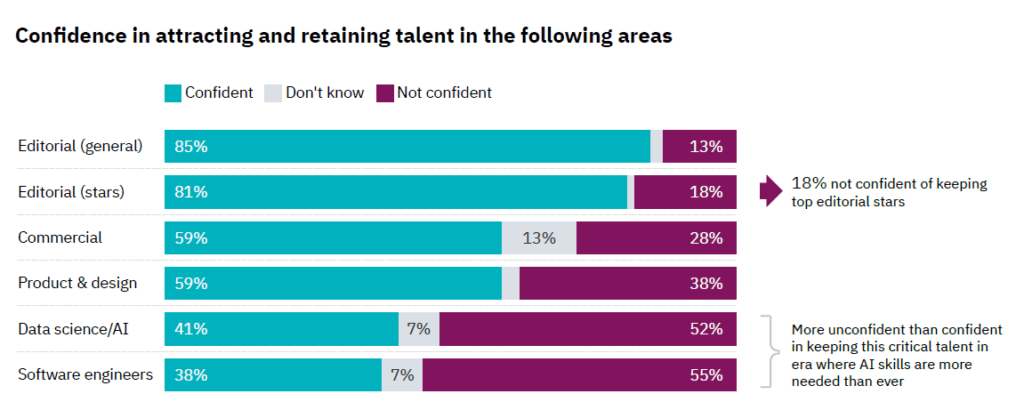Journalism in the Age of AI: Predictions for 2025
Navigating Challenges and Seizing Opportunities

A recent report from the Reuters Institute for the Study of Journalism offers a timely snapshot of the media landscape we’re now navigating. Titled “Journalism and Technology Trends and Predictions 2025,“ the report, authored by Nic Newman and Federica Cherubini, captures the realities of an industry in flux. No longer on the brink of change, journalism is fully immersed in a world shaped by technological disruption, evolving audience behaviors, and a fragmented information ecosystem. The report underscores both the challenges that have come to define this moment and the opportunities emerging as the industry adapts to its new normal. From the growing influence of AI to shifting revenue models and the rise of new voices, the findings reflect a media landscape that is both reinventing itself and grappling with its core identity.
Declining Confidence and Shifting Revenue Models
The report reveals a growing sense of unease among media leaders, with only 41% of surveyed editors, CEOs, and digital executives expressing confidence in the future of journalism, a significant drop of 19 percentage points compared to 2022. This pessimism is driven by concerns over political polarization, attacks on the press, and the erosion of media independence.
Despite these challenges, publishers are adapting their business models to survive in a rapidly changing environment. While subscriptions and memberships remain the primary focus for 77% of publishers, there is a growing emphasis on diversifying revenue streams. Notably, 36% of commercial publishers now anticipate significant licensing income from tech and AI companies, double the figure from the previous year. This shift reflects the increasing reliance on licensing agreements for the use of news content in AI-powered products and services.
The Rise of AI and Search Disruption

The report also highlights the potential disruption to search referral traffic, with 74% of publishers expressing concern about potential declines in referral traffic from search engines due to the rise of AI-generated summaries. This anxiety follows significant drops in referral traffic from Facebook (down 67% in the past two years) and X/Twitter (down 50% in the same period).
Generative AI is making its presence felt in newsrooms, with 87% of publishers believing it is transforming their operations to some degree, and 24% already experiencing full-scale transformation. While back-end automation remains a priority, publishers are increasingly exploring AI’s potential in content creation, newsgathering, and audience engagement. The report predicts continued growth in audience-facing AI features, such as text-to-audio conversion, AI-driven summarization, and AI-powered chatbots and search interfaces.

New Products, New Formats, and the Rise of Influencers
To combat these challenges and attract new audiences, publishers are prioritizing new product development. 44% of respondents consider it crucial to develop new products and services to drive growth, with 42% considering products specifically targeted at younger audiences. These initiatives include bundling strategies, audio expansion, and a reevaluation of print as a channel less susceptible to the influence of big tech.


The report also acknowledges the growing influence of individual news creators and influencers, a trend dubbed the “creator-fication” of news. While some publishers worry about potential risks, such as the spread of misinformation, others see an opportunity to learn from their innovative storytelling techniques and audience engagement strategies.
Key Challenges: News Fatigue and Talent Retention
The report identifies news fatigue among both journalists and audiences as a major concern. To address this issue, news organizations are experimenting with different strategies, including concise explainers, human-interest stories, and innovative approaches to storytelling. Another significant challenge is attracting and retaining talent, particularly in fields like data science and software engineering, with 52% and 55% of respondents, respectively, expressing a lack of confidence in their organization’s ability to secure talent in these areas.

Predictions for the Future
The report concludes with several key predictions for 2025:
- Increased calls for government intervention to ensure fair compensation from platforms.
- More legal action by publishers against AI companies using their content without authorization.
- The emergence of new collaborative intermediaries to help smaller publishers negotiate fair deals with platforms.
- The growth of “prestige TikToks,” with more publishers incorporating short, vertical videos into their digital offerings.
- The continued rise of personalities and influencers, leading to more partnerships between traditional media and creators.
A Pivotal Moment for Journalism
“Journalism and Technology Trends and Predictions 2025” paints a vivid picture of an industry at a crossroads. The report’s authors emphasize the need for news organizations to adapt, innovate, and redefine their role in an evolving media landscape shaped by technological advancement, shifting audience habits, and the growing influence of individual creators. The future of journalism, they argue, hinges on the industry’s ability to embrace change while upholding its core values of accuracy, independence, and accountability.
Chronology of Key Events and Predictions in Journalism: 2024-2025
2024
- June: Aftonbladet launches an ‘election buddy’ chatbot to answer questions about the Swedish elections.
- September: Google releases Notebook LM, garnering internet attention for its ability to turn articles and documents into podcasts.
- November: Romanian Presidential election sees Calin Georgescu rise to prominence using primarily a TikTok campaign. Accusations of foreign interference lead to a re-run.
- The Washington Post launches an experimental Generative AI tool called ‘Ask the Post AI’ that provides answers based on news articles published since 2016.
- December: OpenAI launches ChatGPT Search, featuring aggregated stories with citations, based on deals with publishers like News Corp, Reuters, AP, Financial Times, and Le Monde.
2025
- January: Finnish start-up Uusi Juttu launches, aiming to disrupt traditional media with in-depth features, audio, and newsletter briefings.
ProRata.ai launches its search engine, Gist.ai, offering revenue share options for publishers.
Predictions For the Year
- Ongoing legal battles and negotiations between publishers and AI companies regarding copyright and compensation for content usage.
- Publishers experiment with new products and services to drive growth, including games, education, audio, and video offerings.
- Growing adoption of AI tools in newsrooms for tasks like content creation, newsgathering, fact-checking, and audience engagement.
- Publishers grapple with attracting and retaining talent, especially in areas like data science and software engineering.
- Increased focus on combating news fatigue among audiences, with initiatives focused on positive news, slow journalism, and concise formats.
- Potential for bans and restrictions on social media platforms like TikTok and X (formerly Twitter) due to concerns about misinformation, extremism, and foreign influence.
- Emergence of intelligent agents and conversational interfaces, potentially transforming how people access and interact with news.
About the Authors

- Nic Newman is Senior Research Associate at the Reuters Institute for the Study of Journalism, where he has been lead author of the annual Digital News Report since 2012. He is also a consultant on digital media, working actively with news companies on product, audience, and business strategies for digital transition. He has produced a media and journalism predictions report for the last 15 years. This is the ninth to be published by the Reuters Institute. Nic was a founding member of the BBC News Website, leading international coverage as World Editor (1997–2001). As Head of Product Development (2001–10) he led digital teams, developing websites, mobile, and interactive TV applications for all BBC Journalism sites.

- Federica Cherubini is Director of Leadership Development at the Reuters Institute for the Study of Journalism and an expert on newsroom operations and organizational change, with ten years’ experience spanning major publishers, research institutes and editorial networks around the world. Federica has authored the annual Changing Newsrooms Report (2020–3) and is interested in devising and implementing new and improved ways of working, bridging people, disciplines, departments, projects, and cultures. She is also an expert on newsletter strategies and editorial initiatives that drive audience loyalty.






